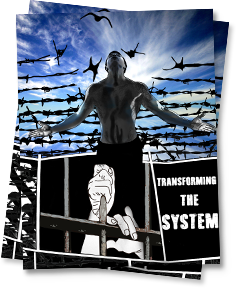Eliminating the criminalization of disabilities
Individuals with physical and mental health concerns are especially vulnerable to increased criminalization. Poorly trained police staff may be ill-equipped to respond to individuals of various abilities and situations may unnecessarily escalate. They are also often targeted for their health status rather than for wrongdoing. During street encounters, police officers are almost twice as likely to arrest someone who appeared to have mental health issues for the same, usually minor infraction. Criminalizing individuals with mental health issues often creates a never-ending revolving door into the criminal justice system with many mental health issues never receiving appropriate care.
The vast population of incarcerated people with mental health issues reflects a justice system that disproportionately arrests, mistreats, retains, and re-arrests them. Today there are three times more people with a serious mental health issues in jails and prisons than in hospitals. In every county in the United States, there are more people with serious mental health issues in the local jail than in the local treatment center. There are more people with mental health issues in Los Angeles County Jail, Chicago’s Cook County Jail, or New York’s Riker’s Island Jail respectively than in any psychiatric hospital in the United States.
Fortunately, the Affordable Care Act provides an opportunity to ensure that people with mental health concerns are not criminalized when they should be treated for their illness. By investing in community mental health resources and appropriate diversions into treatment and away from the criminal justice system at every stage (i.e. arrest, booking, adjudication, detention, re-entry), communities can give people with mental health issues the treatment they need, saving millions of dollars, and creating a healthier, safer, and more equitable society. Police should prioritize diverting people with mental health issues into treatment and away from the criminal justice system before they have been booked.
Several police departments have implemented specialized police responses (SPRs), such as the Crisis Intervention Team, to change the way their officers interact with people with mental health issues. These programs partner with local mental health treatment centers to divert individuals with mental health issues into treatment. It is collaboration between law enforcement agencies, community groups, and public officials. People who are deaf and have other physical disabilities may also be subject to increased marginalization.
To this ensure that individuals are not criminalized for having a disability, Congress, and local and state legislatures should pass legislation that does the following:
- Ensures adequate resources for mental health to address the needs of people with disabilities;
- Reinvests funds from prisons and incarceration to ensure that mental health programs are adequately funded;
- Prohibits inappropriate treatment of mental health issues through criminal enforcement mechanisms;
- Facilitates Affordable Care Act enrollments for persons with disabilities;
- Establishes public education regarding mental health screenings and expanded services available through the Affordable Care Act;
- Provides that, where a police officer is required, properly trained medical responders accompany police members in response to mental health crises and/or provides that dispatchers and police are trained to recognized conflict involving mental health issues and deescalate mental health crisis when they occur, diverting a person with an apparent mental health issues to a treatment center;
- Incentivizes and funds “pilot diversion programs that place treatment decisions within public health systems rather than the criminal justice system,” including diversion prior to booking, during detention, before adjudication, and upon release; and
- Where avoiding arrest and incarceration is not an option, expands the use of specialty courts including, drug courts, DWI courts, mental health courts, and human trafficking intervention courts for persons who indicate that they are survivors of all kinds of human trafficking. These programs should only be adopted as part of a continuum of diversions where they have been proven to reduce incarceration and improve public safety by employing best practices; allowing for proper service provision; providing access to immigration attorneys where there might be immigration-related consequences; and allowing for independent oversight for the programs.
Local governments and police departments should ensure:
- Trained medical professionals are at hand to respond to mental health crises to ensure a proper response and prevent criminalization where medical treatment is more appropriate;
- Police officers are trained on interacting with persons with physical and mental health issues, fostering a culture of respect for human dignity to encourage respect for persons with disabilities;
- Police officers are instructed to divert individuals with mental health issues who are accused of committing a less serious crime to suitable health care services and to avoid incarceration; and
- Partnerships between law enforcement agencies, social service agencies, and civil society are formed to guarantee that people with disabilities, including individuals with mental health disabilities, are referred to social services agencies and civil society groups for appropriate services rather than criminalized, where appropriate.




